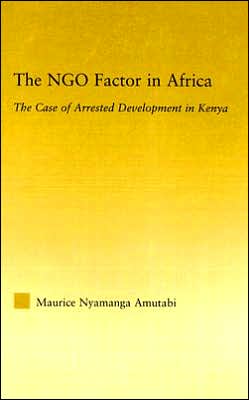The NGO Factor in Africa – The Case of Arrested Development in Kenya
By: Maurice Nyamanga Amutabi
New York: Routledge, 2006
 Maurice Amutabi argues that NGOs in Africa do not really want to eradicate poverty and institutionalise democracy in Africa, but intend to keep Africans poor and needy in order to justify their own existence. In fact, they have never been intending to achieve these goals but have always worked towards maintaining the status quo and benefiting a rich, often foreign, elite instead of helping local people.
Maurice Amutabi argues that NGOs in Africa do not really want to eradicate poverty and institutionalise democracy in Africa, but intend to keep Africans poor and needy in order to justify their own existence. In fact, they have never been intending to achieve these goals but have always worked towards maintaining the status quo and benefiting a rich, often foreign, elite instead of helping local people.
Amutabi uses the case of the Rockefeller foundation in colonial and postcolonial Kenya as case study and his attempt to show historical continuities between pre-and post independence is an interesting take showing the longue durée of the non-state “charitable impulse” (Barrow/Jenkins 2001). However, the argument suffers from a series of weaknesses that renders the book unable to live up to its interesting aim.
First, the argument is bogged down by frequent very broad and improvable claims about NGOs in general – about their role and their hidden agendas with almost no indication of how his one case study justifies these larger claims. Chapters one to four are generally falling into the “NGO bashing” argument, which is, contrary to the author’s claim, not very new, and not confined to the work of NGOs but extends to all kinds of development work (Kabou 1991, Moyo 2009). Like the arguments of those other critics, Amutabi’s broad claims about the detrimental effect of external agents are impossible to prove. A more thorough engagement with the NGO literature since the mid-1990s would have helped to reach a more nuanced and profound discussion about the current knowledge about NGOs in Africa. It might have also helped the author to clarify his terms. What Amutabi calls NGOs are in fact a wide range of different organisations, from international philanthropic foundations (like the Rockefeller foundations in his case study), to international operating NGOs and to national NGOs and local community-based organisations (CBOs). Neither the literature nor the people involved in those organisations would agree to lumping all of them together. Based on his case study the proper literature to review and engage with would thus not have been the NGO scholarship at all but the history of charity in Africa – and one of the standard works, Iliffe’s The African Poor (1987), is not cited.
Contradicting Arguments
The confusion about the proper situation of the book in the academic debate aside, there is an internal contradiction to the argument. Amutabi stresses the role of NGOs (whichever organisation he means with that) in substantially influencing people’s lives for the worse, for example by causing an erosion of traditional social structures (p39). On the other hand he criticises NGOs for being too remote from the lives they claim to improve. In his description NGO staff often only visits communities occasionally and for short periods of time and lack a profound understanding of the lives and needs of the people they claim to represent. This is a valid criticism, but again, something that has been made before and, honestly, with more ethnographic depth (e.g. Nauta 2007) than the anecdotes Amutabi relates in his chapter 2.
So, the reader is left wondering – what will it be: are NGOs so influential on the ground that they can alter social structures, or are they so remote and unknowing that they only occasionally jet into communities and do not really touch the lives they claim to improve? Both arguments have in fact been made about NGOs, it’s just that it is quite difficult to make them in the same book.
My suggestions to anyone interested in the role of philanthropy in colonial and postcolonial Africa would be to read chapters five and six which contain the actual case study and go to the classics like Illife for a thoughtful discussion of the topic. For those interested in NGOs in Africa the work of Amutabi’s fellow countryman Ndegwa (1996) as well as newer accounts (Opoku-Mensah 2006; Bebbington, A. J., et al.,2007 Nauta 2007; Bornstein 2006) are the better read.
—
Dr. Sabine Höhn is a British Academy Postdoctoral Fellow at the University of Glasgow.
Barrow, O. and M. Jennings, Eds. (2001). The charitable impulse : NGOs & development in East & North-East
Africa Oxford; Bloomfield, CT, James Currey ; Kumarian Press.
Bebbington, A. J., et al., Eds. (2007). Can NGOs Make a Difference? London, Zed Books.
Bornstein, L. (2006). “Systems of Accountability, Webs of Deceit? Monitoring and Evaluation in South African
NGOs.” Development 49(2).
Iliffe, J (1987) The African Poor Cambridge University Press.
Lewis, D. and P. Opoku-Mensah (2006). “Moving forward research agendas on international NGOs: theory, agency
and context.” Journal of International Development 18(5): 665-675.
Nauta, w. (2004). The Implications of Freedom – the changing role of land sector NGOs in a transforming South
Africa Muenster, LIT.
Ndegwa, S. (1996). The Two Faces of civil society in Africa – NGOs and politics West Hartford, Kumarian Press.
Kabou, A (1991) Et si l’Afrique refusait le développement ?, l’Harmattan;
Moyo, Dambisa (2009). Dead Aid: Why Aid Is Not Working and How There is Another Way for Africa. New York:
Farrar, Straus and Giroux.
Further Reading on E-International Relations
- Review – Sufism: A Theoretical Intervention in Global International Relations
- Review – Anticolonial Afterlives in Egypt: The Politics of Hegemony
- Review – Race and the Undeserving Poor: From Abolition to Brexit
- Review – The Postcolonial African State in Transition
- Review – Globalizing Morocco: Transnational Activism and the Postcolonial State
- Review – Alienation and Freedom